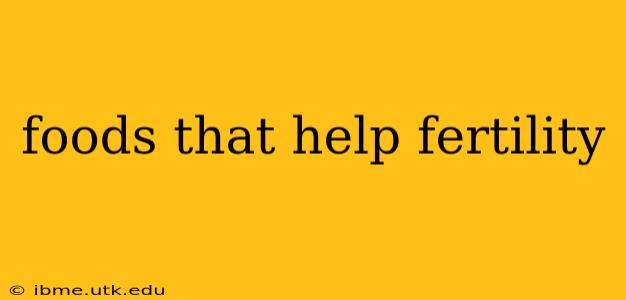Trying to conceive can be an exciting yet challenging journey. While medical intervention plays a crucial role, optimizing your diet with fertility-boosting foods can significantly improve your chances of success. This comprehensive guide explores the best foods to support fertility in both men and women, addressing common questions and concerns.
What Foods Boost Fertility in Women?
For women, a balanced diet rich in specific nutrients is crucial for optimal reproductive health. These nutrients support regular ovulation, healthy egg development, and a thriving uterine environment for implantation.
Foods Rich in Antioxidants:
Antioxidants combat oxidative stress, a major contributor to infertility. Oxidative stress damages eggs and sperm, hindering conception. Excellent sources include:
- Berries: Blueberries, strawberries, raspberries, and blackberries are packed with antioxidants like Vitamin C and anthocyanins.
- Dark Leafy Greens: Spinach, kale, and collard greens are rich in Vitamin C, folate, and other antioxidants.
- Dark Chocolate (70% cacao or higher): Provides flavonoids, a type of antioxidant. Enjoy in moderation!
Foods High in Folate:
Folate is essential for cell growth and development, vital for both the mother and the developing fetus. Deficiency can lead to neural tube defects. Include:
- Leafy Greens: As mentioned above, these are excellent sources of folate.
- Legumes: Lentils, beans, and chickpeas are packed with folate.
- Fortified Grains: Check food labels; many breads and cereals are fortified with folic acid (the synthetic form of folate).
Foods Rich in Iron:
Iron is crucial for healthy blood production, which is especially important during pregnancy. Iron deficiency can negatively impact fertility. Good sources include:
- Red Meat: Lean cuts of beef, lamb, and venison are excellent sources.
- Iron-Fortified Cereals: Check labels for iron content.
- Legumes: Lentils, beans, and chickpeas are good sources of iron, although absorption can be lower than from animal sources.
What Foods Boost Fertility in Men?
Male fertility relies on healthy sperm production and motility. Nutrition plays a critical role in supporting these processes.
Foods Rich in Zinc:
Zinc is essential for testosterone production and sperm development. Good sources include:
- Oysters: Known for their exceptionally high zinc content.
- Beef: Lean cuts provide a good amount of zinc.
- Pumpkin Seeds: A convenient and tasty source of zinc.
Foods Rich in Vitamin D:
Vitamin D is linked to testosterone levels and sperm quality. Good sources include:
- Fatty Fish: Salmon, tuna, and mackerel are rich in Vitamin D.
- Egg Yolks: A good source of Vitamin D.
- Sunlight Exposure: The body produces Vitamin D when exposed to sunlight.
Foods Rich in Antioxidants (Men):
Similar to women, men also benefit from antioxidants to protect sperm from oxidative damage. The same foods listed above for women also apply here.
What Foods Should You Avoid When Trying to Conceive?
Certain foods and substances can negatively impact fertility. It’s important to limit or avoid:
- Processed Foods: High in unhealthy fats, sodium, and additives, they lack essential nutrients.
- Excessive Sugar: Can contribute to hormonal imbalances and inflammation.
- Excessive Caffeine: High caffeine intake has been linked to reduced fertility in some studies.
- Alcohol: Can impair both male and female fertility.
- Soy Products (in excess): While soy contains some beneficial nutrients, excessive consumption may interfere with hormone balance.
How Does Diet Impact Fertility?
A balanced diet directly impacts the health of reproductive organs and the production of healthy gametes (sperm and eggs). Nutrient deficiencies can lead to hormonal imbalances, reduced egg or sperm quality, and impaired reproductive function.
What Supplements Might Support Fertility?
While a healthy diet provides the best foundation, some individuals may benefit from specific supplements. Always consult your doctor before taking any supplements, as they can interact with medications or have potential side effects. Common fertility supplements include Coenzyme Q10 (CoQ10), Myo-inositol, and Omega-3 fatty acids.
Is There a Specific Diet for Fertility?
There isn't one single "fertility diet," but rather an emphasis on a balanced, nutrient-rich diet that addresses the specific needs of reproductive health. Focus on whole, unprocessed foods and limit those detrimental to fertility. Working with a registered dietitian or nutritionist specializing in fertility can provide personalized dietary guidance.
Remember, this information is for general knowledge and does not constitute medical advice. Always consult your healthcare provider for personalized recommendations regarding your fertility journey.
